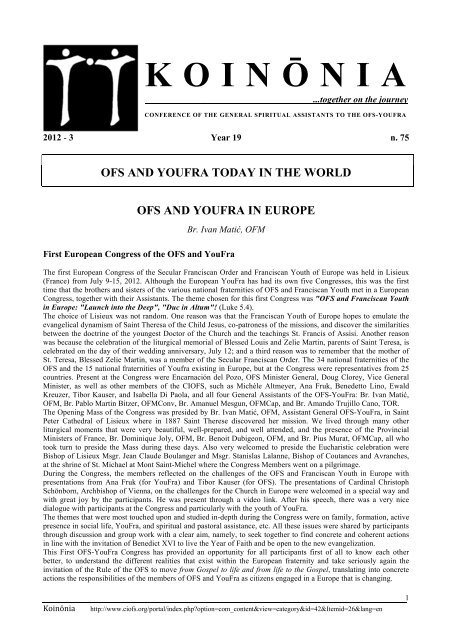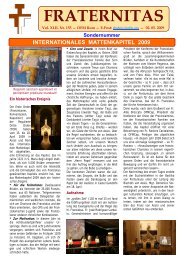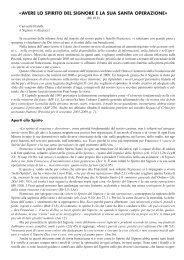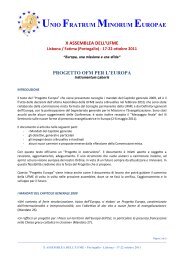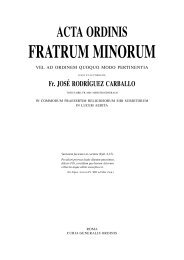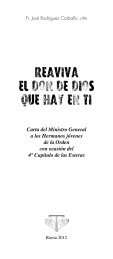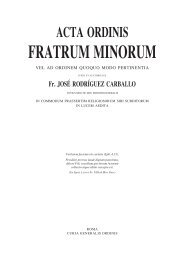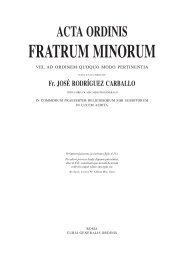English - OFM
English - OFM
English - OFM
Create successful ePaper yourself
Turn your PDF publications into a flip-book with our unique Google optimized e-Paper software.
K O I N Ō N I A_...together on the journeyCONFERENCE OF THE GENERAL SPIRITUAL ASSISTANTS TO THE OFS-YOUFRA2012 - 3 Year 19 n. 75OFS AND YOUFRA TODAY IN THE WORLDOFS AND YOUFRA IN EUROPEBr. Ivan Matić, <strong>OFM</strong>First European Congress of the OFS and YouFraThe first European Congress of the Secular Franciscan Order and Franciscan Youth of Europe was held in Lisieux(France) from July 9-15, 2012. Although the European YouFra has had its own five Congresses, this was the firsttime that the brothers and sisters of the various national fraternities of OFS and Franciscan Youth met in a EuropeanCongress, together with their Assistants. The theme chosen for this first Congress was "OFS and Franciscan Youthin Europe: "Launch into the Deep", "Duc in Altum"! (Luke 5.4).The choice of Lisieux was not random. One reason was that the Franciscan Youth of Europe hopes to emulate theevangelical dynamism of Saint Theresa of the Child Jesus, co-patroness of the missions, and discover the similaritiesbetween the doctrine of the youngest Doctor of the Church and the teachings St. Francis of Assisi. Another reasonwas because the celebration of the liturgical memorial of Blessed Louis and Zelie Martin, parents of Saint Teresa, iscelebrated on the day of their wedding anniversary, July 12; and a third reason was to remember that the mother ofSt. Teresa, Blessed Zelie Martin, was a member of the Secular Franciscan Order. The 34 national fraternities of theOFS and the 15 national fraternities of Youfra existing in Europe, but at the Congress were representatives from 25countries. Present at the Congress were Encarnación del Pozo, OFS Minister General, Doug Clorey, Vice GeneralMinister, as well as other members of the CIOFS, such as Michèle Altmeyer, Ana Fruk, Benedetto Lino, EwaldKreuzer, Tibor Kauser, and Isabella Di Paola, and all four General Assistants of the OFS-YouFra: Br. Ivan Matić,<strong>OFM</strong>, Br. Pablo Martin Bitzer, <strong>OFM</strong>Conv, Br. Amanuel Mesgun, <strong>OFM</strong>Cap, and Br. Amando Trujillo Cano, TOR.The Opening Mass of the Congress was presided by Br. Ivan Matić, <strong>OFM</strong>, Assistant General OFS-YouFra, in SaintPeter Cathedral of Lisieux where in 1887 Saint Therese discovered her mission. We lived through many otherliturgical moments that were very beautiful, well-prepared, and well attended, and the presence of the ProvincialMinisters of France, Br. Dominique Joly, <strong>OFM</strong>, Br. Benoit Dubigeon, <strong>OFM</strong>, and Br. Pius Murat, <strong>OFM</strong>Cap, all whotook turn to preside the Mass during these days. Also very welcomed to preside the Eucharistic celebration wereBishop of Lisieux Msgr. Jean Claude Boulanger and Msgr. Stanislas Lalanne, Bishop of Coutances and Avranches,at the shrine of St. Michael at Mont Saint-Michel where the Congress Members went on a pilgrimage.During the Congress, the members reflected on the challenges of the OFS and Franciscan Youth in Europe withpresentations from Ana Fruk (for YouFra) and Tibor Kauser (for OFS). The presentations of Cardinal ChristophSchönborn, Archbishop of Vienna, on the challenges for the Church in Europe were welcomed in a special way andwith great joy by the participants. He was present through a video link. After his speech, there was a very nicedialogue with participants at the Congress and particularly with the youth of YouFra.The themes that were most touched upon and studied in-depth during the Congress were on family, formation, activepresence in social life, YouFra, and spiritual and pastoral assistance, etc. All these issues were shared by participantsthrough discussion and group work with a clear aim, namely, to seek together to find concrete and coherent actionsin line with the invitation of Benedict XVI to live the Year of Faith and be open to the new evangelization.This First OFS-YouFra Congress has provided an opportunity for all participants first of all to know each otherbetter, to understand the different realities that exist within the European fraternity and take seriously again theinvitation of the Rule of the OFS to move from Gospel to life and from life to the Gospel, translating into concreteactions the responsibilities of the members of OFS and YouFra as citizens engaged in a Europe that is changing.Koinōniahttp://www.ciofs.org/portal/index.php?option=com_content&view=category&id=42&Itemid=26&lang=en1
OFS PRESENCE IN EUROPEEstablished OFS National Fraternity: Austria, Belgium, Bosnia and Herzegovina, Croatia, Denmark, France,Germany, Great Britain, Ireland, Italy, Lithuania, Malta, Netherlands, Poland, Portugal, Czech Republic, Romania,Slovakia, Slovenia, Spain, Sweden, Ukraine, and Hungary.Emerging OFS National Fraternity: Albania, Belarus, Cyprus, Latvia, Moldova, Norway, Russia, and Switzerland.New realities or in the phase of starting an OFS Fraternity: Bulgaria, Estonia, Finland, Greece, Serbia.YOUFRA PRESENCE IN EUROPEEstablished YouFra National Fraternity: Bosnia and Herzegovina, Croatia, France, Italy, Lithuania, Portugal,Slovenia, Spain, Poland.Emerging national fraternities YouFra: Albania, Belarus, Ukraine.New realities and in the phase of starting a YouFra Fraternity: Malta, Czech Republic, Slovakia, Hungary.THE CHALLENGES OF THE SECULAR FRANCISCAN ORDER IN EUROPE TODAYPresentation by Tibor Kauser, OFS, during the OFS-YouFra Congress in FranceEurope – a continent with 50 countries or sovereign states, with a territory of 10,2M sq/km, with a population of 740million people, with more than 100 spoken languages, and with at least three commonly used alphabets. We are livingin a wonderful, multilingual, multicultural continent that is almost the smallest one by its territory, but shows up thegreatest diversity. Its major religion is Christianity, and a vast majority, 76% of the Christians consider themselves to becatholic.Good morning, my dearest sisters and brothers from the various nations from all over Europe to this very first,significant congress of the Secular Franciscan Order and the Youfra. I am really glad to have this opportunity to seemeet you, to learn who we are, who you are, to exchange ideas, to rejoice, and to experience our Franciscan fraternity.It's a privilege for me to have this opportunity to speak to you on this special feast day of St. Benedict, the patron ofEurope.The age we are living in, with its own particular challenges, can seem to be a time of bewilderment. Many men andwomen seem disoriented, uncertain, without hope, and not a few Christians share these feelings. There aremany troubling signs which at the beginning of the third millennium are clouding the horizon of the Europeancontinent, which “despite great signs of faith and witness and an atmosphere undoubtedly more free and unified, feelsall the weariness which historical events – recent and past – have brought about deep within the hearts of its peoples,often causing disappointment”. (Pope John Paul II., Ecclesia in Europa, 7.)This is the beginning of the exhortation of JPII. Europe is in crisis. Today there's said to be a deep, grave economic andfinancial crisis. I'm not an expert in this sense so I can't oppose, however, I think it is rather a spiritual and moral crisis.Pope John Paul II said that Europe is a missionary area. And like every crisis, it is a gift to discover how to go on, howto change things, and it is a challenge. If we think that things are going well, we don't feel the need to change; we don'tfeel the need of conversion. It is the deepest temptation to fall asleep and not to do anything, not to seek God's will. So,this is not only a time of difficulties, not only a time of dark moments, but also the time of hope, the time of future.Challenge means that we are looking to the future. We do not give up. We are seeking solutions. Crisis is a blessing, itis a gift to hear the call of God: come rebuild...If things were o.k. in the sense of spirituality and morality, I am sure there would be no economic crises. This is alsoshowing us the way how to start it. “Francis, go! Repair my house, which, as you see, is falling completely to ruin.”When the house is in ruins, we must not start the repair with the roof, but with the basement, then the structural parts,and we have to accept, that these parts are those not very much looking. Furthermore, if we do our jobs well, they willbe hidden by the end. But we must do them; otherwise the whole building will be falling into ruins, even if looking veryattractive. I am an architect, so this example is really not very far from me. This is a crisis of the values, a crisis of thepriorities. We have to do penance and see, what are our values, what are our priorities. Also, we have to look aroundand see where the world is going; discover day by day; where we are living; where is God calling us to go; what God iscalling us to do. What is Europe like, today? What are the most important aspects and challenges for us, SecularFranciscans?Koinōniahttp://www.ciofs.org/portal/index.php?option=com_content&view=category&id=42&Itemid=26&lang=en2
Christian roots of EuropeTruth does not depend on its being announced. Many believe that truth is what is announced more and more loudly,what is proclaimed more visibly. God doesn't need this; his truth is deep and independent. Europe has Christian roots, itis a fact, and it doesn't depend on whether it is announced or not, accepted by politicians or not. It is very important tobe aware of this, primarily not for God – he knows it very well – but for us.Unity and diversityOne of the greatest challenges of Europe is to bring diversity and the desire of unity in harmony. There are more than100 different languages, more than 50 different cultures. One of the strongest bonds that link these nations, thesecultures, these languages, is Christianity. We have a lot of common things, we have common Christian roots, and manyparts of our cultures are common. We have to strengthen this common sense of belonging. However, this age is anindividualist age. The individual persons are said to be the ideals, who are independent, who do not have bonds. It is avirtue not to have bonds, neither to a society, nor to a local community, to a fraternity, nor to family members offeringto live together as a family, nor to another person by the sacrament of the marriage, even not to God either. But loosingthe bonds is the way to lose hope. At the root of this loss of hope is an attempt to promote a vision of man apart fromGod and apart from Christ. (Pope John Paul II., Ecclesia in Europa, 9.)This total misunderstanding of freedom has lead to the present situation of the man. Furthermore, since “no man is anisland” (Thomas Merton), man has been created to live in relationships, to have bonds, this is something that cannot bestepped over, and thus instead of the dependence from God there are new bonds: the independent man is dependingfrom passions, depending from material goods, from money, became addict. As far as I am convinced, I know only oneanswer to this challenge; it is to restore the communion with God in its various visible forms, i.e. in the sacrament ofmarriage, the Christian family, the fraternal life, the belonging to the Church, the belonging to God in the personalconversion– all the forms of communion. We have to live a true fraternal life in our fraternities; we have to experiencethe fraternal life, the life-giving union with each other. This is an opportunity to bear witness that turning to each other,to seek community and live a fraternal life is the solution to the problem of the fragmentation of the society, for thelonesome victims of the age of individualism. This is particularly important, when we are facing the problem of ageingin the Order, offering the experience of the community, of the fraternal spirit. The man of our times is suffering fromindependence, from the lack of human relations, so let us offer them our fraternal experiences.All over Europe, crisis has been headline news for a long time. But we have to see, that financial matters make diversitybeing misunderstood. We, here in Europe, have a treasure, this great variety of the nations, but also we can see that thisvariety is very much misunderstood. There's rivalry instead of collaboration and complements. Differences are cominginto the front and similarities have been pushed back, common roots and common values are put aside. North is againstsouth, west is against east. Possible partners are made enemies to one another. There are deep contradictions under theveil of the superficial smiles. Certainly, there are some particular challenges that our Order is facing, beside thebeautiful and encouraging examples of young, vivid fraternities of the OFS and YouFra in some countries. Like thewhole Catholic Church in Europe, also our Order is going down in number, particularly in some countries. We must notneglect the problem of ageing, while many fraternities have the experience of far not being attractive to others,particularly to young people. Since the first orders are struggling with the same problem, the question of the spiritualassistance is a more and more significant challenge. So, let us see, what we, Secular Franciscans may, can and shall do.There are many sources we could turn to, but I think our Rule is the best source for us. And when I say, 'we', I meanboth all of us individually, and also our fraternities, as living signs of the Franciscan spirituality in the world. Let uskeep in mind, that we have to give testimony, we have to respond to the challenges of our times both individually andalso in our fraternities. Neither this nor that must not be missing.All who love the Lord with their whole heart, with their whole soul and mind, with all their strength, and love theirneighbours as themselves and hate their bodies with their vices and sins, and receive the Body and Blood of our LordJesus Christ, and produce worthy fruits of penance. Oh, how happy and blessed are these men and women …(Exhortation of St. Francis to the Brothers and Sisters of Penance)This is the beginning. Love the Lord, turn to the Creator instead of turning only to the creations, turn to each otherinstead of turning inside, and doing penance, striving to a permanent conversion. This shall be the spiritual base ofeverything we do, and without this there's nothing we can do. The renewal of the house has to be started with thebasement, as I said before.They have been made living members of the Church by being buried and raised with Christ in baptism; they have beenunited more intimately with the Church by profession. Therefore, they should go forth as witnesses and instruments ofher mission among all people, proclaiming Christ by their life and words. Called like Saint Francis to rebuild theChurch and inspired by his example, let them devote themselves energetically to living in full communion with the pope,bishops, and priests, fostering an open and trusting dialogue of apostolic effectiveness and creativity. (Rule 6)When the Church is less and less respected in Europe, this article 6 of our Rule has a particular importance. We belonghere! We have to show that we are members of the Church. Not only to show that we are members of a greatorganization, that has billions of members and is widespread all over Europe and all over the World, but primarilybecause it is the body of Christ. Confessing belonging to the Church means that we confess our belonging to Christ. Asan organization it is far not perfect, otherwise there wouldn't have been any need to call Francis: go, and rebuild myChurch. Our testimony is essential. Our fraternal spirit and our humble participation in the society has to show that theKoinōniahttp://www.ciofs.org/portal/index.php?option=com_content&view=category&id=42&Itemid=26&lang=en3
Church is not offensive, what is often said as an accusation. We have to strengthen the Church. The Secular FranciscanOrder cannot exist without or outside the Church. When we love our Order, we love the Church. When we worry aboutthe future of the Order, we worry about the future of the Church. When we build our fraternities, we build the Church.We have to be inserted into the various ecclesial communities – parishes, dioceses – otherwise our fraternities will nothave any future.As Jesus was the true worshipper of the Father, so let prayer and contemplation be the soul of all they are and do. Letthem participate in the sacramental life of the Church, above all the Eucharist. Let them join in liturgical prayer in oneof the forms proposed by the Church, reliving the mysteries of the life of Christ. (Rule 8.) On this road to renewal thesacrament of reconciliation is the privileged sign of the Father's mercy and the source of grace. (Rule 7.)Participation in the sacramental life of the Church is much more than a pious behaviour, moreover, has more than onlyspiritual aspects. Participating in the sacramental life means to participate in the society, living a secular life that has aprofound sacramental base, which has an impact on our acts, attitudes and responses to the challenges of our times.Baptism is the primary reflection on the question of the protection of life. Becoming the child of God is the elementarydecision of God for the man. This is the expression of God's 'yes' to life. Our response is our 'yes' to the very first call ofGod instead of saying 'no' to the gift of life. We have to promote to accept the gift of God instead of refusing it. In theEucharist we experience the real presence of Jesus Christ, and this presence gives us the strength in the world thatdenies this existence. All our life has to shine the joy of Christ. Look, how sad they are those who are living withoutGod. Eucharist is the sacrament of communion. No community can exist without this real presence of the Lord. In thesacrament of reconciliation we can give witness to the forgiving love of God: when God forgives our sins in thesacramental ambit, it must give us an inspiration to reconcile with ourselves and to reconcile with others. These threegoes together: to reconcile with God, with myself and with my neighbour. Without the first two we cannot bring peaceto the society, what is a part of our vocation: being bearers of peace. The Franciscan testimony in situations ofopposition is rather to convince than to win, as God does it with us.“God created man in his own image, in the image of God he created him; male and female he created them. And Godblessed them, and God said to them, ‘Be fruitful and multiply’” (Gen 1:27-28)Do we see that the image of God is a couple, a community, a family? It is considered to be very contemporary to liveunmarried, to be single, to live together without marriage, while this misunderstanding of independence makes peoplebecome lonesome, even though if living a very active social life. The seal of the marriage seems to be today a hiddentreasure, but it is only God who can overcome the problems of this kind. Let us rediscover and let rediscover, that Godis the very first example of community, of the family relationships. Anointing of the sick is the sacramental sign of life,the expression of the love of God in his real presence, standing on the opposite side of the euthanasia that criticallyunder-evaluates the life of the sick and elderly. When giving testimony of this sacramental life we offer our Franciscanresponse to these challenges.This secular Franciscan approach of the sacramental life is much more than experiencing the liturgy of the sacramentsinside the Church (building), it is a part of our vocational journey so that the power of God provided through thesacraments may become a reality also in the world by offering ourselves as instruments of the Lord.United themselves to the redemptive obedience of Jesus, who placed his will into the Father's hands, let them faithfullyfulfill the duties proper to their various circumstances of life. Let them also follow the poor and crucified Christ,witness to him even in difficulties and persecutions. (Rule 10.) Let them esteem work both as a gift and as a sharing inthe creation, redemption, and service of the human community. (Rule 16.)Politicians are challenged by the matter of economic balance right now. Economy is ruled by the financial markets, andthe really lucrative areas are far away from the decent honest handwork and from those fields giving result of the heavy,toilsome work. We, Secular Franciscans never strive to get to the higher classes of the society. While some values arevirtual, money is virtual in the world, but God is very concrete. We have to respect the value of the honest work and todo our best to see “the fruit of the work”.Let them individually and collectively be in the forefront in promoting justice by the testimony of their human lives andtheir courageous initiatives. Especially in the field of public life, they should make definite choices in harmony withtheir faith. (Rule 15)This is in a close connection with the question of social justice, both inside the individual countries, and also among thedifferent countries. Who is rich and who is poor? Who are our friends? And when quoting the Rule speaking ofdifficulties, we must avoid thinking only of the personal needs, the personal difficulties, the personal persecutions. Wealways have to stand on the side of the outcast, of the minorities, of those groups in grave difficulties – who have losttheir jobs, their homes, their families, their money, their hope, their faith, and finally their awareness of being able tolove and to be loved. We have to see both the individuals and the whole groups, accepting that each one of us has adifferent capacity and a personal mission. There is a wide horizon opened for us. Society is suffering from theecological, environmental issues. Care of the creation, pollution, the exportation of garbage, of pollution, ofunderdeveloped technologies, from west to the east, the pollution of the seas – grave problems and we already haveseen wonderful examples in our Order how to face these challenges. High tech is too high. There is a temptation that weknow too much, we are God, we do not need any gods any more. We very easily separate ourselves from God. Also,this high-tech excludes a lot of people from the society. You are nobody if you do not have an e-mail address, a bankaccount, a cell phone, a credit card or the newest widgets. This affects generations, specially the weakest ones: theyoungest and the eldest, but also those who cannot afford it. Exactly whom we have to accompany. Let us explain them,Koinōniahttp://www.ciofs.org/portal/index.php?option=com_content&view=category&id=42&Itemid=26&lang=en4
that God is not asking for a Facebook 'like', and let us stand for them, also by our personal example. Civil life is aprivilege for us. We have to live with the opportunities of the democratic societies (whenever and wherever we havethem). Active citizenship is a must. We have to promote peace, we have to promote justice, we have to be active in thecivil life, in the public life of the society.Being – actingI have to talk about one more fundamental problem. Nowadays acting is preceding the existence, the 'being'. This is thetime of the devaluation of the being, and the dominance of acting. Only those are valuable in the society who are active,who are productive. The more you produce, the more you act, the higher you will be respected. We have to re-establishthe value of being. God is being. “I am who am”. The self-determination of God does not include any reference to hisacts, to his creative power. He is the existence; this is what he finds the utmost important to tell us about himself, eventhough there isn't anybody more active than him. We have to rediscover the value of those creatures of God, who areunproductive: the babies, the elderly, the sick, the handicapped. They are not valuable because of any pious “Christian”or human sense of love. They are valuable because they are the image of God, as everyone is. Essentially they are notless than anyone else. The values of - living or any other - creatures are not based upon their expedience, upon theirusefulness. If it weren't so, what would be with the arts, with the nature, with the beautiful sites? Let us recall theattitude of St. Francis, and follow his example! Moreover they should respect all creatures, animate and inanimate,which bear the imprint of the Most High, and they should strive to move from the temptation of exploiting creation tothe Franciscan concept of universal kinship. (Rule 18) This attitude is also an expression of the contemplative nature ofour vocation. As Jesus was the true worshipper of the Father, so let prayer and contemplation be the soul of all they areand do. (Rule 8.) Living a contemplative life in a secular state of life? Yes, it is not only possible but recommended. It isa real challenge – also here, in Europe, on a continent of material and technical development – to discover the value of'being', and admiring the creative power of God, who has created everyone and everything around us. It is one way ofliving a contemplative life by separating oneself from the world in a total dedication to the prayer focusing not only thespiritual eyes but also the bodily eyes on God.There is another way, opened for us, seculars: to contemplate God in all his creatures, and praise him for all whom andall that we meet in the world, dedicating us to live in our secular state of life, in a family, having our professional workon a daily base, finding our missionary duties in the family, at work, in the ecclesial community. This is how we,secular Franciscans can join Francis in his desire to be always with the Lord, while he was obedient to go to the worldfor the sake of others. (Fioretti XVI.)Mindful that they are bearers of peace which must be built up unceasingly, they should seek out ways of unity andfraternal harmony through dialogue, trusting in the presence of the divine seed in everyone and in the transformingpower of love and pardon. Messengers of perfect joy in every circumstance, they should strive to bring joy and hope toothers. (Rule 19). Our weakness is our strength. We are not powerful. We must get strength from the grace of the Lord,and from the example of those secular Franciscans, who have given this testimony of the Franciscan spirit in the world,from St. Elisabeth, the king St. Louis, throughout St. Angela of Foligno, and others, up to the secular Franciscans of ourages, like László Batthyány-Strattmann, Konrad Adenauer or Franz Jägerstetter. We belong to an Order. Order meansthat what is first is put first, what is last, is put last. Things have their place. We have a certain priority; we have thehouse built in a correct way, built on a rock. Belonging to an Order is a grace. We have to be thankful.Being secular Franciscans is a vocation, a way of life, where we can acknowledge and be aware of the values, we haveour priorities. This is our chance to face the challenges of Europe today. We often think that we are weak, we are old,we are few, how can we stand? But let us never forget, that we are not alone. Even though our ark seems to be veryfragile, we are here, in the Church and in the OFS. We have our Master and Lord, who is inviting us: set out to the deep.DUC IN ALTUM!CHALLENGES FOR YOUFRA IN EUROPEPresentation by Ana Fruk, OFS, during the OFS-YouFra Congress in FranceIntroductionThis is a historic moment for the Franciscan Family in Europe, especially for the life of Secular Franciscans. ThisCongress is a kind of new beginning for Secular Franciscans’ charisma because this is the 1 st time that we celebrate thisEuropean Congress together (OFS and YouFra). On other continents this is already a well established practice but inEurope we have had only YouFra Congresses. If I may say, they were a little bit ahead of us. What did YouFra talkabout in these Congresses? Let me just remind you.I European YouFra CongressJerbon (Santiago de Compostela),Spain - July 27 - August 2, 1999“With saint Francis towards year2000”KoinōniaII European YouFra CongressPorto, PortugalAugust 7 - 12, 2001“Globalization: challenges and valuesfor YouFra in Europe”III European YouFra CongressSamobor – Ptuj, Croatia - SloveniaAugust 17 - 23, 2003“Together with saint Francis”http://www.ciofs.org/portal/index.php?option=com_content&view=category&id=42&Itemid=26&lang=en5
IV European YouFra CongressAssisi – La Verna, ItalyAugust 25 – 29, 2006“Francis, from dream to sign”V European YouFra CongressVilnius, Kretinga, Kaunas - LithuaniaAugust 18-24, 2009“Through martyrdom to resurrection”Through these themes YouFra was trying to get to know each other better and to find ways of personal growth as wellas the growth of a fraternity. Today I’m going to tell a little bit about challenges YouFra is facing.Example of YouFra in CroatiaLet me start by introducing myself and the country I’m coming from. Croatia is a Mediterranean country with 20 yearsof independence and democracy. But before the Croatian people, mostly Catholic tradition, suffered from thecommunist regime in Yugoslavia for 45 years. Deprived of religious freedom, freedom of property, thought and otherfreedoms, national identity was suppressed. Life of the secular fraternities was reduced to individual devotion of thosewho continued daring to live their faith despite oppression, one of many victims was blessed Alojzije Stepinac, Cardinaland Archbishop of Zagreb, Secular Franciscan too. The first years of Croatian independence were marked by theaggression of Serbia which was completed in 1995. The similar thing happened in our neighbouring country Bosnia andHerzegovina. The people you have among yourselves, this young people, lived this war. They are aware how importantit is to build peace, to rely on God, and to be connected to the Church through its priests. This was also one of thereasons why YouFra in Croatia began. Friars wanted to offer to the young people some hope, a view to a better futurerelied on Jesus by the example of St. Francis and St. Clare. They started to gather youth in prayer, in concrete actions(by visiting people in need which during the war were many). And it showed them they are useful, needed, capable andprecious for the world they are living in.The situation of YouFra todayAs some of you have had the opportunity to hear at the General Chapter in Brazil, today YouFra exists in 67 countriesand has about 49.000 members. Out of that, 9 established YouFra fraternities and 5 emerging are in Europe. As we haveheard during the presentations, some fraternities of the OFS are having some difficulties in organizing YouFrafraternities. Among other things, this is also the consequence of the situation in Europe in general, which I’m going todescribe soon. But now I would like to mention that, as CIOFS Presidency and YouFra Commission, we have tried inthe past several years to help OFS and YouFra fraternities to organize better. The most recent document that you havereceived in May is called Guide for the establishment of a new YouFra fraternity. I won’t present it in details now but Iwould like to draw your attention to it because there are very concrete things, requirements, necessary for establishmenta new YouFra fraternity. This document, as well as all other YouFra documents you can find at www.ciofs.org/youfra.The situation in Europe todayEurope has witnessed the rise, especially in the last century, of totalitarian ideologies and extreme forms of nationalismwhich sparked conflicts both within and between nations, leading up to the immense tragedy of the two World Wars.More recent ethnic conflicts, which have again led to bloodshed on the continent of Europe, have once moredemonstrated to everyone how fragile peace is, how it requires an active commitment on the part of all 1 . Europe isknown as the “cradle of Christianity” but in a 2000-year-old history there have been lots of influences that are trying todiminish the importance of Christian roots, to suppress them and even to forget them, especially in the last decades.“There can be no doubt that the Christian faith belongs (...) to the foundations of European culture. Christianity in facthas shaped Europe, impressing upon it certain basic values. Today’s Europe however, at the very moment it is in theprocess of strengthening and enlarging its economic and political union, seems to suffer from a profound crisis ofvalues. While possessed of increased resources, it gives the impression of lacking the energy needed to sustain acommon project and to give its citizens new reasons for hope” 2 , said the Pope John Paul II in his Post-synodal apostolicexhortation Ecclesia in Europa.Joy – proclaiming the Gospel even when in chainsAnd who can give these new reasons of hope to Europe? The youth. How? During Pope Benedict’s apostolic journey tomy country (Croatia) in 2011, he presided the Prayer Vigil at the main square of Zagreb with 25.000 young people. And1 EE 112.2 Ecclesia in Europa (EE) 108.Koinōniahttp://www.ciofs.org/portal/index.php?option=com_content&view=category&id=42&Itemid=26&lang=en6
on that occasion he addressed youth talking about difficult moments in which young people can find themselves,referring to the situation of St. Paul (letter to the Christians of Philippi). He said that even when in chains “thepreaching and testimony of the Gospel cannot be chained. Saint Paul’s experience reveals how it is possible, along thejourney of our lives, to preserve joy even in moments of darkness.” He encouraged us not to “yield to the temptation ofputting all our trust in possessions, in material things, while abandoning the search for the truth which is always‘greater’”, which is “capable of giving meaning to our daily lives”. This is why we need today a new evangelization,new beginnings. And youth can have here an essential role. Europe is a “Franciscan continent”, in a sense that St.Francis and st. Clare, whose anniversary we are celebrating this year, were born in Europe. In this continent the “firstfollower of st. Francis in the world” (secular) was born in Europe – st. Elisabeth of Hungary, as well as st. Louis, theking of France, in whose country we are gathered today. Those young people in their own time inspired people to jointhem. This should be the mission of our Franciscan youth too. How to do that? How to inspire young people not only tojoin us but to stay with us?Authentic life – Present in public – Creativity“... in the countries of the East the problem of how to conserve their newly refound freedom is highlighted, in those ofthe West they are questioning themselves on how to live an authentic freedom” 3 . And precisely that is the answer to allour questions – to live an authentic life. This is how st. Francis attracted all those people. I believe this authentic lifemeans to have the life of prayer. Every day needs to be filled with a prayer. Maybe this authentic life also understandsbeing present in public life. This is certainly a challenge for all Franciscans. As I said, on one hand we have people,who, for decades, had to keep quiet and reserved vis-à-vis the socio-political news. Even today, when people exercisedemocracy, as it is, this attitude persists in society and even among members of our Franciscan family. Thus, sometimeswe prefer to limit our activities to the devotion and charity to risk nothing, and in this way the initiatives, which aremore and more numerous each day, are blocked. On the other hand, we have the challenge of being faithful toChristian values in the society that offers absolute freedom, the right of choice without taking any responsibility for theactions. It is difficult to direct the youth if they are “driving without any signs” (directions). What we have to offer tothe youth is a possibility for creativity. We should be able to recognize the need in our concrete society and inaccordance to that, react. Collaboration with other Church institutions, but also with civil society organizations, willenable us to feel brothers and sisters with all men of good will, as it is said in our Rule.Our goals should be: to help youth in their personal mature growth; to help them specialise in specific areas (media, communication, family, politics and civil society,economy, ecology, etc.); to educate our young brothers and sisters from the beginning to address the social problems; to have good communication with them.The difficulties that we encounter are: the lack of understanding what lay spirituality really is, what the identity of YouFra really is (in theChurch, inside of the Franciscan Family and Secular Franciscans themselves) the indifference for being actively present in the Church and in the society and insufficient formation forthat, as well as the incapacity to attract the youth by our own example.What are the positive aspects of this effort that needs to be done in regard to YouFra – for our Order, for the Church,for the society? With this kind of authentic life, we can offer the youth an alternative to what today’s society offersthem. Working together with youth in different social initiatives, we can mobilize a relatively large number of brothersand sisters of the Order (including members of YouFra). It will allow us to better understand our brothers and sistersand live our fraternity more intensely. Also, the Order can become more visible in the Church and in civil society. Andwhat is very important, we can together break the prejudices that exist and put us in dialogue with those who do notshare our faith and value system. Is it not a good way to build a more fraternal world? An opportunity forevangelisation?3 Pontifical Work for Ecclesiastical Vocations: New Vocations for a New Europe (In verbo tuo), 11a.Koinōniahttp://www.ciofs.org/portal/index.php?option=com_content&view=category&id=42&Itemid=26&lang=en7
NEWS - CHAPTERS - VISITS - MEETINGSCroatia – Br. Petar Filić, <strong>OFM</strong>, has passed awayOn 9 May 2012, after a long illness, Br. Petar Filić, <strong>OFM</strong>, a member of the Croatian Franciscan Province of Sts.Cyril and Methodius in Zagreb, passed away. Among the many important commitments he has done in his Province,Fr. Petar worked very much with YouFra and was the National Assistant of Croatia. We commend his soul to theLord of life and may the Risen Christ be his eternal joy.Costa Rica – The OFS National Elective ChapterThe OFS National Elective Chapter of Costa Rica took place on July 15 in Saint Francis College, Moravia, San José,Costa Rica. This Chapter was chaired by Alberto Zaldaña, OFS, International Councilor of El Salvador and delegateof Encarnación Pozo, OFS Minister General; he was accompanied by Br. Walter Loáisiga, <strong>OFM</strong>, Vicar of theConvent of Saint Francis in Moravia, San José, Costa Rica, and delegate of CAS. In attendance were members of theoutgoing National Council, the Ministers of the seven local fraternities, and delegates of each local fraternity, Br.Carlos Artiga <strong>OFM</strong>, OFS Spiritual Assistant, Lourdes Rodríguez, Head of the National YouFra, and Jorge Rivera,National Manager of NIFRA (Niñez Franciscana = Franciscan Childhood). Ricardo Herrera was elected NationalMinister and International Councilor of OFS to Costa Rica, while Fanny Rojas was elected Vice-National Ministerand International Councilor Substitute. The Chapter began with a Mass celebrated by Br. Victor Mora, <strong>OFM</strong>Conv.The new National Council took office during a Liturgy of the Word, presided over by Br. Walter Loáisiga.Rwanda – Fraternal and Pastoral visit and celebration of the Elective National Chapter of the OFSIn the convent of the Friars Minor at Kivumu (Rwanda) from the 25 th to the 31 st of July 2012 the fraternal, pastoralvisit and the celebration of the Elective National Chapter of the emerging National Fraternity of OFS in Rwanda tookplace. The honourable Visitators who were present were Michèle Altmeyer, the Councillor of the Presidency ofCIOFS for the French speaking and Br. Ivan Matić, <strong>OFM</strong>, the General Assistant of OFS-YOUFRA. There wereabout 50 capitular members who participated at the Chapter and their National Assistant Br. Kizito Ngomanzungu,<strong>OFM</strong>, a diocesan priest and two Religious sisters who serve as spiritual assistants. The first part of the Chapter wasdedicated to listening to the reports of the outgoing National Council, and this was followed by work in groups todetermine priorities for the next three years. The morning of the second day dealt with these themes: vocation andmission of OFS (presented by Michèle) the spiritual and pastoral assistance (presented by Br. Ivan) In the afternoonthe elective process got underway, during which the capitular members elected the new National Council.Faustin Ngendahayo was re-elected as Minister. During their visit and stay in Rwanda the Visitators, alwaysaccompanied by the members of the National Council, conducted several meetings: with the community of the PoorClare Sisters, the local Fraternity of OFS of Muhororo – the latter render special service of assistance to handicappedchildren. They met with members of OFS and YOUFRA, also with Religious: brothers and sisters who are involvedin spiritual assistance. After the Chapter there was an opportunity to meet with many Franciscan groups of childrenand youth and members of YOUFRA of Kuvumi. Another occasion was the meeting of Michèle and Br. Ivan –accompanied by members of the National Council- with the bishop of the Diocese of Kabgayi Msgr SmaragdeMbonyintenga.Together with the new National Council, the Visitators participated in the pilgrimage to the Shrine of “Our Lady ofSorrows” of Kibeho. Before the heavenly Mother they presented the National Fraternity of OFS and all theFranciscan Family in Rwanda. They prayed for peace and reconciliation, which remain always necessary in thisbeautiful land which was subjected to tremendous suffering, pain and trauma, where the wounds of the genocide of1994 are still hurting and yet to heal. During the visit to the Shrine they also met Nathalie Mukamazimpaka – one ofthe visionaries – living at the Shrine serving the pilgrims. She gave a beautiful testimony.Ireland - The OFS National Elective ChapterFrom August 25-26, 2012, the National Fraternity of Ireland has celebrated its national elective Chapter in Dublin, atAll Hallows College, Drumcondra. The elections were held in a fraternal spirit, in the presence of Br. Stephen Innes,<strong>OFM</strong>Cap, as the delegate of Br. Martín Bitzer, <strong>OFM</strong>Conv, General spiritual Assistant. Colm McConfhaola is thenew national Minister and Breda Casserly, the international Councillor. It was a great joy that all the nationalspiritual assistants were present: Br. Aiden <strong>OFM</strong>Conv, Br. Pious <strong>OFM</strong> and Br. Michael, <strong>OFM</strong>Cap. The elections andtheir outcomes were very satisfactory and the National Council, assisted by 3 spiritual Assistants, is well equipped tolead the OFS Fraternity in Ireland to new levels of identity, recruitment and mission.Nicaragua – The OFS National Elective ChapterFrom September 3-5, 2012, marked the OFS National Elective Chapter of Nicaragua. In attendance on behalf of theCIOFS were Mario Torraza, delegate of the Minister General of OFS, who presided over the elections, accompaniedby Br. Walter Jimenez Herra, <strong>OFM</strong>, who acted as delegate of the Conference of Assistants General of OFS-YouFra.Guadalupe Jarquin e Angela Ramos elected both as National Minister and International Councilor.Koinōniahttp://www.ciofs.org/portal/index.php?option=com_content&view=category&id=42&Itemid=26&lang=en8


